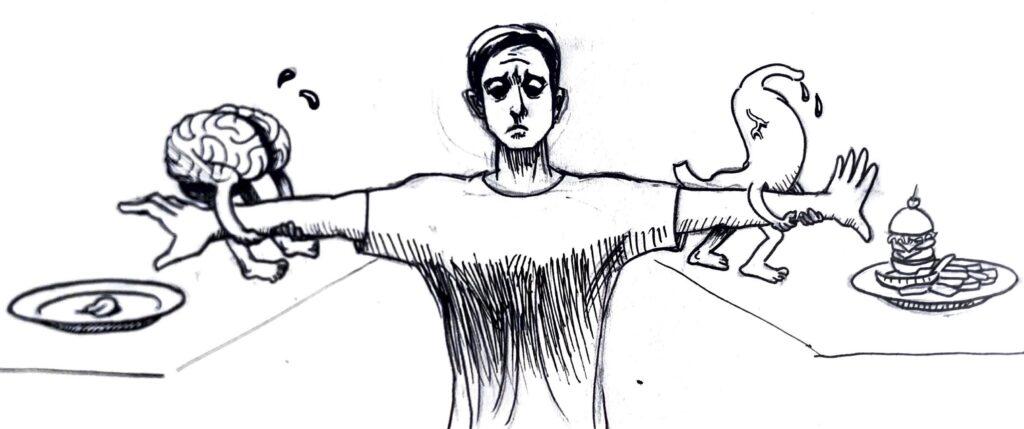Modern culture seems to gravitate toward the extremes, and online diet advice is no exception. Social media is heavily populated by content creators or influencers showing off their perfect bodies, getting their audience to believe they can attain this physique by eating the same foods shown on the screen.
Instead of a sensible response to this cacophony of performance-enhancing drug abuse, plastic surgery, product placement and outright lies, diet culture has triggered the other extreme: the fat acceptance movement. Individuals who are hundreds of pounds overweight and clearly struggle to perform basic functions such as walking trumpet the message that “big is beautiful” and blame everyone other than themselves for their struggles in society.
While beauty is subjective, heart attacks, strokes, diabetes and organ failure are not. Neither are the gastrointestinal problems, developmental problems, fainting, anxiety and depression brought about by eating disorders stemming from social media’s unrealistic body image standards and a misguided preoccupation toward health.
It seems like people have to choose the lesser of two evils when deciding their attitudes about food. The scourge of anorexia and bulimia, which affects millions of Americans, is well documented and remains a prominent issue for people of all ages. Because our society is hyper-fixated on weight loss, influencers easily gain starry-eyed followers by promoting sham diets with inadequate nutrient profiles. Sugar, carbohydrates and fats have been demonized, and the unfortunate masses are instructed to adopt highly restrictive diet plans to attain an arbitrary standard of thinness.
Not only is being skinny a perceived sign of attractiveness, diet culture has made it an indicator of a person’s character. Overweight people are still implicitly deemed “lazy” or “undisciplined” since the classic beauty standard is so ingrained in our minds. Hence, influencers effectively take advantage of our insecurities and desperation to fit in by endorsing self-imposed starvation in the pursuit of superficial appearances. With the mental and physical strain that comes along with it, this lifestyle is far more harmful than a few pounds of belly fat.
Additionally, with the resurgence of online fitness content during and after quarantine, influencers have also added another layer to their business model. Rather than just encouraging weight loss, influencers appeal to people aiming to build muscle and lose body fat. Much of their audience are teenagers with little experience in fitness, and as a result they do not have realistic expectations for the amount of progress they can make in a given amount of time.
Some of the misinformation is fairly harmless, such as the myth of the “anabolic window,” which purports that one must consume protein within 30 minutes of finishing a workout in order to build muscle. However, others encourage trainees to consume extreme amounts of calorie-dense food, much of it loaded with sodium and unhealthy fats, in a so-called “dirty bulk.” Although it will successfully pack on mass, dirty bulking places trainees at a higher risk of heart disease, diabetes, high blood pressure and obesity.
The wider issue with diet culture is the sheer prevalence of misinformation online. Most influencers are not licensed medical professionals, and it’s a good bet none of them care much about you as a person. They say what they say because they have something to gain, whether it is ad revenue or profits from selling supplements, diet plans or workout routines. Because thousands of videos are posted every day, large-scale fact-checking is impossible. The only people you should trust when it comes to dieting are medical professionals.
However, not everyone has the time or money to consult a doctor for a simple diet, so there are some things one can keep in mind when considering the reliability of an online source. If the creator of a video cites studies or other scholarly sources to support their claims, you can look up those studies yourself to check their validity. While there are plenty of influencers with large followings that give terrible advice, large influencers also fall under higher scrutiny from the community. If the general consensus from other creators is that the influencer in question makes reputable, science-based content, it might be worth listening to them. Of course, take everything online with an enormous grain of salt.
Predatory influencers also pander to instant gratification. They offer strange diets and ineffective workout routines, promising toned abs or bigger arms in 30 days. Making noticeable progress in the gym takes months of planning and sustained effort, so when these online diets and fitness routines don’t deliver on their promises, many beginner trainees give up. In rare cases, they turn to performance enhancing drugs, which are as bad for cardiovascular health as being hundreds of pounds overweight.
Healthy food can be delicious, and eating it can become a lifelong habit. Truth be told, most of us don’t need to follow an elaborate diet to gain or lose weight. Wanting to get fit is an admirable goal — simply having that goal places you above the majority of Americans. Self-hatred shouldn’t be the motivation. Instead, it’s best to see improving your diet and fitness as one of the greatest acts of self-love. You can’t be healthy at every size, but you can safely and smartly pursue your health goals.
























